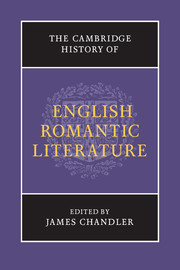Book contents
- Frontmatter
- Introduction
- Part I The Ends of Enlightenment
- Part II Geographies: The Scenes of Literary Life
- 5 London in the 1790s
- 6 Edinburgh and Lowland Scotland
- 7 Romantic Ireland: 1750–1845
- 8 France, Germany, America
- 9 The ‘warm south’
- 10 Country matters
- 11 Romanticism and the wider world: poetry, travel literature and empire
- 12 The homes of England
- 13 Writing, reading and the scenes of war
- 14 Regency London
- Part III Histories: Writing in the New Movements
- Part IV The Ends of Romanticism
- Chronology
- Bibliographies
- Index
- 1 A New Pocket Map of the Cities of London and Westminster; with the Borough of Southwark, Comprehending the new Buildings and other Alterations, 3rd edn (London: William Faden, 1790).">
- References
5 - London in the 1790s
from Part II - Geographies: The Scenes of Literary Life
Published online by Cambridge University Press: 28 May 2009
- Frontmatter
- Introduction
- Part I The Ends of Enlightenment
- Part II Geographies: The Scenes of Literary Life
- 5 London in the 1790s
- 6 Edinburgh and Lowland Scotland
- 7 Romantic Ireland: 1750–1845
- 8 France, Germany, America
- 9 The ‘warm south’
- 10 Country matters
- 11 Romanticism and the wider world: poetry, travel literature and empire
- 12 The homes of England
- 13 Writing, reading and the scenes of war
- 14 Regency London
- Part III Histories: Writing in the New Movements
- Part IV The Ends of Romanticism
- Chronology
- Bibliographies
- Index
- 1 A New Pocket Map of the Cities of London and Westminster; with the Borough of Southwark, Comprehending the new Buildings and other Alterations, 3rd edn (London: William Faden, 1790).">
- References
Summary
Perambulation
Caleb Williams, fleeing from Fernando Falkland and his creature, his all-seeing spy Gines, repeatedly determines to conceal himself in London, which, by reason of its huge population and ‘the magnitude of its dimensions’, he believed would offer him ‘an inexhaustible reservoir of concealment’. In the event, of course, when at last he manages to reach the metropolis, he discovers that within the limits of that apparently limitless space, news travelled faster than he, a country boy, had ever imagined. When Gines causes his description to be circulated by means of a halfpenny handbill sold in the streets, Caleb suddenly finds himself trapped in ‘the gaze of indiscriminate curiosity’; his pursuer had multiplied himself until ‘a million of men’, in every quarter, every house of the vast city, would now be looking with a ‘suspicious eye’ on ‘every solitary stranger’.
Inexhaustible though Caleb believed London to be, there was nothing new at all, nothing specific to the 1790s, about the hyperbole by which London is prefigured in his imagination before his arrival there. We can read this language of vastness, of limitlessness, of the inexhaustibility, so reminiscent of Burke’s definitions of the sublime, as evidence of a kind of late eighteenth-century metropolitan sublime. It is as if an aesthetic developed primarily – at least as far as it was a visual aesthetic – to describe wild landscape that resisted the taming, the domesticating power of civilization, has suddenly collided with a new kind or degree of civilization itself, a city, as Wordsworth described it, of ‘streets without end’, thronged with ‘face after face’ in an endless parade of anonymity.
Keywords
- Type
- Chapter
- Information
- The Cambridge History of English Romantic Literature , pp. 127 - 158Publisher: Cambridge University PressPrint publication year: 2009
References
- 1
- Cited by



